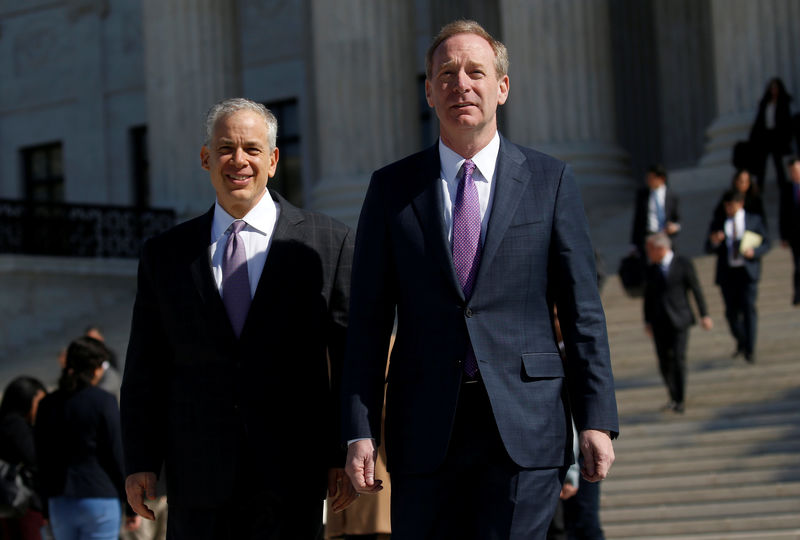By Lawrence Hurley and Dustin Volz
WASHINGTON (Reuters) - Supreme Court justices on Tuesday wrestled with Microsoft (NASDAQ:MSFT) Corp's dispute with the U.S. Justice Department over whether prosecutors can force technology companies to hand over data stored overseas, with some signaling support for the government and others urging Congress to pass a law to resolve the issue.
Chief Justice John Roberts and Justice Samuel Alito, both conservatives, hinted during an hour-long argument in the case at support for the Justice Department's stance that because Microsoft is based in the United States it was obligated to turn over data sought by prosecutors in a U.S. warrant.
As the nine justices grappled with the technological complexities of email data storage, liberals Ruth Bader Ginsburg and Sonia Sotomayor questioned whether the court needed to act in the data privacy case in light of Congress now considering bipartisan legislation that would resolve the legal issue.
A ruling is due by the end of June.
"Wouldn't it be wiser to say let's leave things as they are. If Congress wants to regulate this 'Brave New World,' let them do it," Ginsburg said.
Alito agreed that Congress should act but added that "in the interim, something's got to be done."
Roberts appeared concerned that companies like Microsoft could enable customers to evade the reach of U.S. prosecutors by deliberately storing data overseas.
The case pits the interests of tech companies and privacy advocates in protecting customer data against the demands of law enforcement in gaining information vital to criminal and counterterrorism investigations.
It started with a 2013 warrant obtained by U.S. prosecutors for emails of a suspect in a drug trafficking investigation that were stored in Microsoft computer servers in Dublin. Microsoft challenged whether a domestic warrant covered data stored abroad. The Justice Department said prosecutors were entitled to the data because Microsoft is headquartered in the United States.
The New York-based 2nd U.S. Circuit Court of Appeals in 2016 sided with Microsoft, handing a victory to tech firms that increasingly offer cloud computing services in which data is stored remotely. President Donald Trump's administration appealed that ruling to the Supreme Court.
The appeals court said the emails were beyond the reach of domestic search warrants obtained under a 1986 U.S. law called the Stored Communications Act.
Bipartisan legislation has been introduced in Congress to update the 1986 statute, a move backed by both Microsoft and the administration. The measure would let U.S. judges issue warrants while giving companies an avenue to object if the request conflicts with foreign law. If Congress were to pass the bill before the Supreme Court rules, the case would likely become moot.
Senator Orrin Hatch, a Republican who has led the efforts to rework the law, was in the courtroom to hear Tuesday's argument, and afterward noted that various justices had referred to the importance of Congress acting.
"Our bill, the Clarifying Lawful Overseas Use of Data (CLOUD) Act, would resolve the question currently before the Court in a way that balances consumer, law enforcement, and privacy interests. This commonsense legislation has the full-throated support of both law enforcement and the tech community and deserves swift enactment," Hatch said in a statement afterward.
Globally dominant American tech companies have expressed concern that customers will go elsewhere if they think the U.S. government's reach extends to data centers all around the world without changes being made to the law.
Microsoft, which has 100 data centers in 40 countries, was the first American company to challenge a domestic search warrant seeking data held outside the United States.
The Microsoft customer whose emails were sought told the company he was based in Ireland when he signed up for his account.
Other companies including IBM (NYSE:IBM) Corp, Amazon.com Inc (NASDAQ:AMZN), Apple Inc (NASDAQ:AAPL), Verizon Communications Inc (NYSE:VZ) and Alphabet (NASDAQ:GOOGL) Inc's Google filed court papers backing Microsoft.

The administration has the support of 35 states led by Vermont.